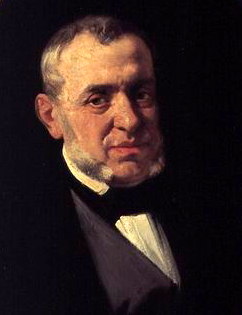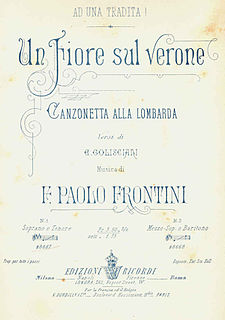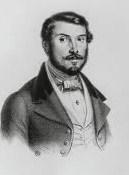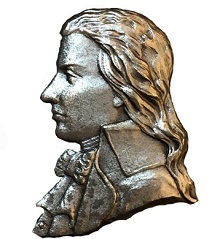
Giuseppe Saverio Raffaele Mercadante was an Italian composer, particularly of operas. While Mercadante may not have retained the international celebrity of Gaetano Donizetti or Gioachino Rossini beyond his own lifetime, he composed as prolific a number of works as either; and his development of operatic structures, melodic styles and orchestration contributed significantly to the foundations upon which Giuseppe Verdi built his dramatic technique.

Luisa Miller is an opera in three acts by Giuseppe Verdi to an Italian libretto by Salvadore Cammarano, based on the play Kabale und Liebe by the German dramatist Friedrich von Schiller.

Salvadore Cammarano was a prolific Italian librettist and playwright perhaps best known for writing the text of Lucia di Lammermoor (1835) for Gaetano Donizetti.

Enrico Golisciani was an Italian author, born in Naples. He is best known for his opera librettos, but also published a slim volume of verses for music, entitled Pagine d'Album ; many more of his poems intended to be set to music were published in the Gazzetta Musicale di Milano.

Il giuramento is an opera in three acts by Italian composer Saverio Mercadante. The libretto, by Gaetano Rossi, is based on Victor Hugo's 1835 play Angelo, Tyrant of Padua..

Orazi e Curiazi is an opera by the Italian composer Saverio Mercadante. It takes the form of a tragedia lirica in three acts. The libretto, by Salvadore Cammarano, is based on the Roman legend of the fight between Horatii and Curiatii. It was first performed at the Teatro San Carlo, Naples, on 10 November 1846.

La vestale is an opera by Italian composer Saverio Mercadante. It takes the form of a tragedia lirica in three acts. The libretto, by Salvadore Cammarano, was influenced by Victor-Joseph Étienne de Jouy's libretto for Spontini's more famous 1807 opera of the same name.

Eugenia Tadolini was an Italian operatic soprano. Admired for the beauty of her voice and stage presence, she was one of Donizetti's favourite singers. During her career she created over 20 leading roles, including the title roles in Donizetti's Linda di Chamounix and Maria di Rohan and Verdi's Alzira. She was born in Forlì and studied music there and in Bologna before making her debut in Florence in 1828. She sang in all of Italy's leading opera houses, as well as in Paris, Vienna, and London before retiring from the stage in 1852. She spent her remaining years first in Naples, where she had been the Teatro San Carlo's reigning prima donna for many years, and then in Paris, where she died of typhoid fever at the age of 63. From 1827 to 1834, she was married to the Italian composer and singing teacher, Giovanni Tadolini.
Raffaele Mirate was a celebrated Italian operatic tenor who had an active career from the 1830s through the 1860s. Known for his intelligent phrasing and bright and powerful vocal timbre, he was regarded as an outstanding interpreter of the tenor roles in the early and middle period operas of Giuseppe Verdi. He notably created the role of the Duke of Mantua in the world premiere of Verdi's Rigoletto in 1851. He was also a highly regarded interpreter of bel canto roles, excelling in the operas of Vincenzo Bellini, Gaetano Donizetti, and Gioachino Rossini.

Elena da Feltre is an opera in three acts by 19th-century Italian composer Saverio Mercadante from a libretto by Salvatore Cammarano, well known as librettist of Donizetti's Lucia di Lammermoor and Verdi's Il trovatore. The premiere took place at the Teatro San Carlo in Naples on 1 January 1839 as part of the Carnival Season. While not successful at the time, the opera was revived at La Scala in 1843 with twenty performances.

Giacomo Roppa was an Italian operatic tenor who was active career in Italy's most important opera houses from the 1830s through the 1850s. He also made appearances at the Liceu in Spain. He is best remembered for creating the role of Jacopo Foscari in the world premiere of Giuseppe Verdi's I due Foscari in 1844.

L'ultimo giorno di Pompei is an opera in two acts composed by Giovanni Pacini to an Italian libretto by Andrea Leone Tottola. It premiered to great success at the Teatro San Carlo in Naples on 19 November 1825 followed by productions in the major opera houses of Italy, Austria, France, and Portugal. When Pacini's popularity declined in the mid-19th century, the opera was all but forgotten until 1996 when it received its first performance in modern times at the Festival della Valle d'Itria in Martina Franca. L'ultimo giorno di Pompei influenced either directly or indirectly several other 19th-century works, most notably Karl Bryullov's 1833 painting, The Last Day of Pompeii.

Pelagio is an opera in four acts by Saverio Mercadante. The Italian-language libretto was by Marco D'Arienzo. It premiered on 12 February 1857 at the Teatro San Carlo, Naples, to great success.

Il bravo, ossia La Veneziana is an opera in three acts by Saverio Mercadante to an Italian-language libretto by Gaetano Rossi and Marco Marcello. Their libretto was based on the play La Vénétienne by Auguste Anicet-Bourgeois, which was in turn based on James Fenimore Cooper's novel The Bravo. The opera premiered on 9 March 1839 at La Scala, Milan and subsequently played throughout Italy and abroad. The opera was still being occasionally performed and recorded in the 20th century. and was hailed as an "exciting rediscovery" when it was staged by the Wexford Festival in 2018.
Nitocri is an opera in two acts composed by Saverio Mercadante to libretto by Apostolo Zeno adapted by Lodovico Piossasco Feys. The libretto is a fictionalised account of the Egyptian queen Nitocris. The opera premiered at the Teatro Regio in Turin on 26 December 1824.

Nicola De Giosa was an Italian composer and conductor active in Naples. He composed numerous operas, the most successful of which, Don Checco and Napoli di carnevale, were in the Neapolitan opera buffa genre. His other works included sacred music and art songs. His songs were particularly popular, bringing him fame as a salon composer both in Italy and abroad. De Giosa died in Bari, the city of his birth, at the age of 66.

I briganti is an opera (melodramma) in three acts by Saverio Mercadante, first performed on 22 March 1836 by the Théâtre-Italien in Paris, with an Italian libretto by Jacopo Crescini based on Schiller's Die Räuber. The lead roles were written for bass Luigi Lablache, tenor Giovanni Battista Rubini, baritone Antonio Tamburini and soprano Giulia Grisi. The opera did not do well in Paris, and the cast departed for London.

Giovanni Emanuele Bidera was an Italian writer of Albanian and Greek extraction. He is primarily known as the librettist of Gaetano Donizetti's operas Gemma di Vergy and Marino Faliero, but he also wrote many other librettos for lesser known composers as well as plays, essays, books about Naples, and a treatise on acting. Bidera was born in the small Sicilian town of Palazzo Adriano and spent most of his career in Naples. In 1850 he retired to Palermo where he died at the age of 73.

Luigi Capotorti was an Italian composer of both sacred and secular music. He was the maestro di cappella of several Neapolitan churches; the composer of ten operas, five of which premiered at the Teatro San Carlo in Naples; and a teacher of composition and singing whose students included Stefano Pavesi and Saverio Mercadante. Born in Molfetta, he studied violin and composition at the Conservatorio di Sant'Onofrio in Naples and spent his entire career in that city. In his later years, Capotorti retired to San Severo, where he died at the age of 75.
Savino Monelli was an Italian tenor prominent in the opera houses of Italy from 1806 until 1830. Amongst the numerous roles he created in world premieres were Giannetto in Rossini's La gazza ladra, Enrico in Donizetti's L'ajo nell'imbarazzo and Nadir in Pacini's La schiava in Bagdad. He was born in Fermo where he initially studied music. After leaving the stage, he retired to Fermo and died there five years later at the age of 52.












